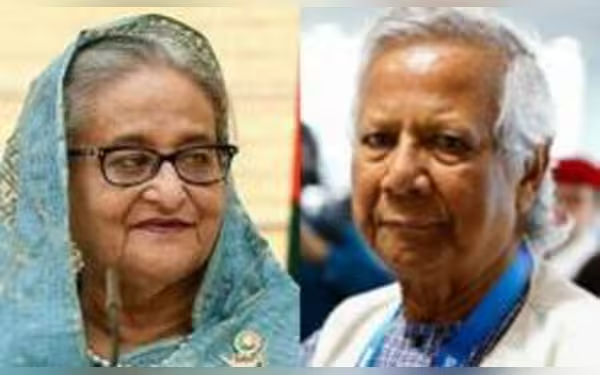Saturday, November 16, 2024 03:22 PM
Yunus Urges Hasina to Remain Silent Amid Political Turmoil in Bangladesh
- Yunus advises Hasina to 'keep quiet' in India.
- Tensions rise between Bangladesh and India post-Hasina's departure.
- Public demands justice for protest-related deaths.
 Image Credits: nation_pk
Image Credits: nation_pkYunus calls for Hasina to remain silent in India as Bangladesh faces political unrest and demands for justice.
In a significant political development in Bangladesh, the country’s former Prime Minister, Sheikh Hasina, has found herself in a precarious situation after being ousted from power. Following her dramatic exit from the political scene, Hasina fled to India by helicopter, seeking refuge as protests erupted against her government. This marked the end of her 15-year rule, which was characterized by strict governance and increasing public discontent. The interim government, now led by Nobel laureate Muhammad Yunus, is under immense pressure to address the unrest that led to her downfall.
Yunus, who has taken on the role of interim leader, recently made headlines by stating that Hasina should “keep quiet” while she remains in India. He emphasized that her continued public statements and instructions from abroad are not only unwelcome but also detrimental to the political climate in both Bangladesh and India. Yunus remarked, “If India wants to keep her until the time Bangladesh wants her back, the condition would be that she has to keep quiet.” This statement reflects the growing frustration among the Bangladeshi public regarding Hasina’s influence even after her removal from power.
Since her departure on August 5, tensions have escalated between Bangladesh and India, as Hasina’s former government relied heavily on India for support. The interim government is now faced with the challenge of managing these diplomatic relations while also addressing the demands for justice related to the violent protests that led to her ousting. The call for Hasina’s extradition and trial over the deaths of demonstrators during the unrest has become a focal point of public discourse.
As the situation unfolds, it is crucial for both nations to navigate this complex political landscape carefully. The relationship between Bangladesh and India has historically been significant, and how they handle this crisis could have lasting implications for regional stability. The people of Bangladesh are looking for accountability and a resolution to the turmoil that has plagued their country. In this context, Yunus’s comments serve as a reminder of the delicate balance that must be maintained in international relations, especially when political leaders find themselves in contentious positions.
Ultimately, the future of Bangladesh hinges on the actions taken by its interim government and the response from the international community. As the world watches, the hope is that a peaceful resolution can be achieved, allowing the nation to move forward from this turbulent chapter in its history.













